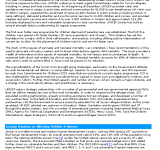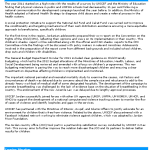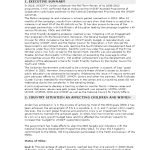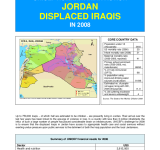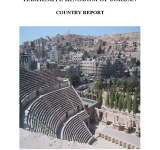اليونيسيف
The 2011 annual report provides a comprehensive summary of the ongoing projects by the UNICEF Jordan Country Office (JCO). The programmes and projects include social protection initiatives for the National Aid Fund and Zakat Fund;; national perinatal and neonatal mortality study and development of nationwide computerized violence tracking system. . The analysis of the report is based on the progress and assessment of the JCO’s projects in partnership with other organizations in relevant fields including the Ministries of Interior;; Awqaf and Islamic Affairs and other UN agencies (UNDP;; UNFPA;; UNWOMEN;; UNHCR and WHO). The report specifies the organization’s methodology in collecting data and evidence and monitoring mechanisms to track and assess programme progress. In evaluating the development of ongoing projects;; the report summarizes future work plans and examines critical factors and constraints in each project.
The annual report provides an overview to the country situation in regards to children and women and summary of the humanitarian and developmental assistance of the UNICEF Jordan Country Office (JCO) in 2010. The report includes Jordan’s progress in achieving the Millennium Development Goals in addition to the analysis of the organization’s projects. The projects focus on assisting Iraqi children in education and strengthening young child survival and development and adolescents’ participation and empowerment. The analysis of the report is based on the progress and assessment of the JCO’s projects in partnership with other UN agencies;; local agencies and government ministries. Some highlights of the 2010 annual report include the Ma’An campaign to end violence in school;; the UNICEF’s partnership with the government in supporting Iraqi children in gaining access to public education and a joint programme to develop a tracking system to monitor family violence and abuse cases with other UN agencies and Jordan’s National Council for Family Affairs.
The aim of the report is to identify the critical issues of the Iraqi refugees in 2008;; especially the vulnerable groups of children and women and their humanitarian needs. The report examines the lack of legal framework in Jordan to identify the status of Iraqi refugees and obtain quantitative information about them. Additionally;; it looks at other urgent issues including unemployment;; lack of access to education and health care and high level of post-traumatic stress syndrome among the refugees. The report summarizes key actions and achievements of the UNICEF in 2007. It also includes the organization’s plans for the humanitarian action in areas of health and nutrition;; education;; and child protection in the following year in response to the urgent issues.
The report was published from the World Health Organization/ United Nations Children’s Fund (WHO/UNICEF)’s pilot project to test a method for the rapid assessment of the quality of drinking-water in six countries;; including Jordan;; China;; Ethiopia;; Nicaragua;; Nigeria and Tajikistan. This assessment report aims to develop a tool that would support WHO/UNICEF’s joint program in strengthening the monitoring efforts of the global access to safe drinking water. The analysis of the report is based on the water samples and statistical data that were collected from 1600 drinking water supply sites in 67 clusters. The report finds that drinking water quality is generally high in the distribution network of Jordan and national standards for bacteria complies with the WHO guideline values. It also identifies the sanitary risk factors for Jordanian water supplies including the presence of sewer lines;; old pipes and failure to properly maintain household storage tanks.
أُجري هذا التقرير على مدار أربعة أشهر في لبنان والأردن;; ويركز على التحديات المؤلمة التي تواجه أطفال اللاجئين السوريين كل يوم. والهدف من هذا التقرير هو إعداد تقرير قائم على الأدلة من زاوية إنسانية;; تستهدف قاعدة عريضة من الجماهير لرفع الوعي بشأن التحديات التي تواجه حماية الأطفال;; وإعطاء فكرة عن كيفية استجابة وكالة الأمم المتحدة وشركائها;; وتسليط الضوء على بعض الفجوات التي تتطلب اهتماماً عاجلاً من جانب المجتمع الدولي. وتم اعتماد منهجية تتألف من مراجعة مكتبية للتقارير والتقييمات القائمة;; إلى جانب جمع البيانات وإجراء بحث ميداني في كل من المواقع الحضرية والريفية وفي المخيمات. وقد تم جمع المعلومات من خلال مناقشات مجموعة التركيز والمقابلات التي أجريت مع الأطفال اللاجئين وعائلاتهم;; إلى جانب اللاجئين العاملين مع الأطفال داخل مجتمعاتهم وموظفي المفوضية وغيرها من المنظمات العاملة مع الأطفال اللاجئين.
